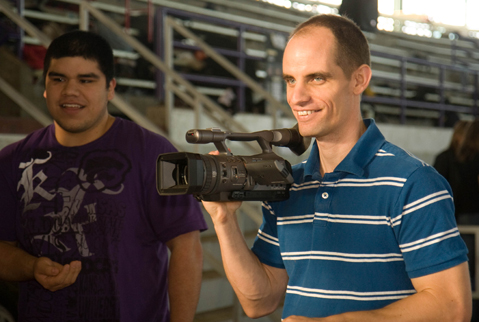Internet Anthropologist
Michael Wesch Shows How the Internet Is Changing Us

To be clear, this Facespace-obsessed, 140-characters-at-a-time, turn-on-plug-in-and-download-from-anywhere age that we are living in is changing us. Perhaps we are too busy updating our status or hustling a game of Words with Friends at the dinner table or reading a breaking news story about a C-list celebrity’s drinking habits to notice these cultural mutations, but make no mistake: This hyper-connected now is revolutionizing our behavior and the way we relate to each other. In short, as Michael Wesch, an anthropologist from Kansas State University and leading global authority on the topic of new media and its cultural clout, put it recently, “In the last 10 years, for the first time ever, it has become possible for anybody anywhere in the world to reach out to anyone else anywhere else in the world. … These are very dramatic times.”
Wesch, an award-winning 36-year-old associate professor who has been dubbed “The Explainer” by Wired magazine for his ability to eloquently and entertainingly pull back the curtain on this unfolding digital age, has spent the majority of his career in academia thinking about the broader meaning of our technology-driven “remix culture” and the context of it all in our global society. Technically speaking, Wesch is a cultural anthropologist, but more specifically, he is a new-media ecologist — an expert on the intersection of new media and human relations. He studies things like YouTube, the ways breaking news stories are reported nowadays versus 15 years ago, and the role of Facebook and Twitter in phenomena such as the Arab Spring. When asked for his thoughts on the pros and cons of these things, Wesch does not hesitate, “It is both an amazingly good and an amazingly bad thing at the same time. … I mean, the ability to connect and share information has never been better, but then, you know, who needs the KGB when you have Facebook? The effects of this are far deeper, more pervasive, and more surprising than you would ever expect.”
Appropriately, Wesch’s growing prominence in this growing field of study is due thanks to a YouTube video he made in 2007. In the video, titled Web 2.0 … The Machine is Us/ing Us, Wesch, smartly employing nothing more than the drag-and-click wonders of the Internet itself, shows in under five minutes just how radical and wide-open and different the world is when human interaction is enhanced by new technologies. In it, the Internet is revealed as a game-changing canvas for communication, filled with links that, despite looking static on your screen, are actually living and powerful and purposely designed mechanisms of unbridled sharing. “I am just trying to uncover aspects of [the new-media phenomenon] that maybe people haven’t realized before and show them a little more about what is really going on,” said Wesch.
This week, Wesch — who, in addition to his commitments as a teacher and a researcher, has also become a rather popular public speaker — is coming to UCSB to talk new-media shop. With a spirit of hands-on collaboration, Wesch’s interactive presentation promises to be something that has meaning for everybody. “I’m going to do more than just explain how new media is changing our world,” he promised. “I’m going to try and show people specifically how new media is changing our world.”
4•1•1
Michael Wesch will give a free talk Tuesday, April 24, 8 p.m., at UCSB’s Campbell Hall. Call 893-3535 or visit artsandlectures.sa.ucsb.edu.



